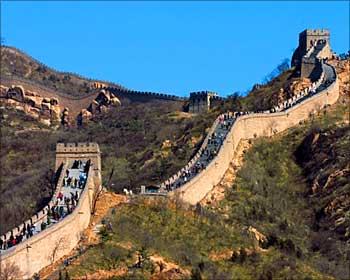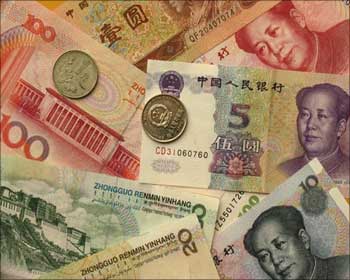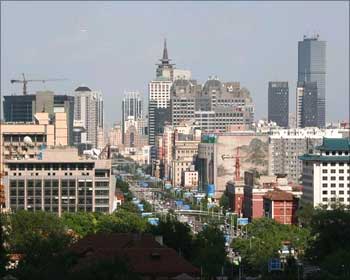As the world reels under the negative impact of economic slowdown, China's growth story continues to get rave reviews.
"China is leading the world economic recovery based on fresh data from the first half of the year," the official Xinhua news agency claimed recently.
But controversy continues to swirl around the accuracy of such claims. Serious doubts surfaced as the latest set of first-half numbers provided by provincial-level authorities are far higher than the central government's national figure.
According to data released individually by China's 31 provinces and municipalities GDP totalled RMB 15,376 billion ($2,251 billion) in the first half. This is 10 per cent higher than the official first-half GDP figure of RMB 13,986 billion published by the National Bureau of Statistics.
How correct are China's GDP figures?
Image: The Great Wall of China.At the beginning of the year, Beijing had pegged China's growth target at 8 per cent.
NBS data said China's GDP grew by a robust 7.9 per cent in the second quarter from a year earlier, boosting growth to 7.1 per cent in the first half of 2009.
The same agency also reported that plagued by the global economic turmoil China's first-half exports plunged 21.8 per cent. Experts point out that an economy, which is primarily driven by exports, is bound to suffer under the circumstances.
"It is reasonable to simply dismiss Chinese economic results," wrote Derek Scissors, an economist and research fellow at the Washington-based Heritage Foundation in a Web posting.
"The results are manufactured to suit the Communist Party," he concluded.
How correct are China's GDP figures?
Image: Chinese currency.NBS data on wages also came in for sharp criticism. NBS said the actual per capita income of urban Chinese reached Yuan 8,856 ($1,296) on average in the first half of this year (or Yuan 1,476 a month), a growth of 11.2 per cent from a year ago.
Even average cash income (excluding income in kind) of farmers jumped 8.1 per cent to Yuan 2,733 per capita in the same period.
This shows that despite a slowdown, China's citizens still managed to increase their incomes.
How correct are China's GDP figures?
Image: The City of Beijing.The Wall Street Journal published a story on May 15 that raised concerns by the International Energy Agency over the trustworthiness of China's statistical data. The IEA alleged that China's reported GDP growth in the first quarter did not mirror data about oil and electricity demand.
The NBS income statistics were not only ridiculed by the public, even commentaries on state-run media openly questioned their reliability, saying the figures were too good to be true.
Interestingly, a People's Bank of China's study to measure how comfortable people feel living with their current incomes registered a negative 8.6 per cent in the second quarter.
Economists warn that policies based on such false statistics could have disastrous outcomes.
NBS, however, junked all criticism and said 'the seeming inconsistency could be ascribed to obvious changes in economic structure'.
Also, a recent report ssuggeted that China, which depends a lot on its enviable growth engine -- exports, might for the first time in three decades slip into a trade deficit over the next 18 months. If that happens, the impact on economies and currencies around the world could be momentous
The global economic carnage that led to consumer demand in the developed nations fall sharply has had a telling effect on China.





article